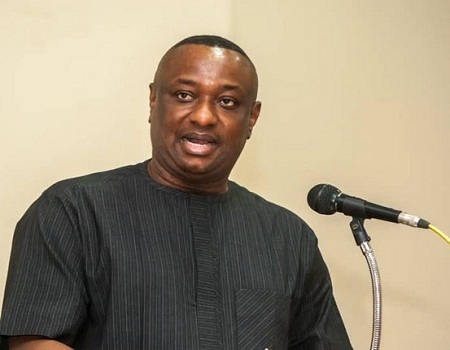Festus Keyamo, the Minister of Aviation and Aerospace Development, has advised global aviation stakeholders on the need to harmonize the development, production and deployment of the proposed Sustainable Aviation Fuels-(SAF).
The Aviation Minister, who spoke on behalf of the continent at the ongoing Third ICAO Conference on Aviation and Alternative Fuels, reminded the organizers of the submissions at the 41st ICAO Assembly, where the global aviation stakeholders resolved to work together to strive to achieve a collective long-term global aspirational goal for international aviation (LTAG) of net-zero carbon emissions by 2050.
“As we gather here in CAAF 3 to review and update the 2050 ICAO Vision for SAF, including LCAF and other cleaner energy for aviation, to define a global framework, I wish to highlight that no particular region should be left behind in developing, producing and deploying SAF/LCAF and other cleaner energy for aviation.
“Cost and affordability are central issues to implement policies supporting the Vision. Noting that the price differential of SAF/LCAF is higher than conventional jet fuels today, the global framework must address the availability, reliability and affordability of SAF/LCAF and its cost impacts on airfares. Any potential targets or any amount of SAF/LCAF and other cleaner energy for aviation to replace conventional fuels should be a global target without attribution or commitment of individual State targets.
“The global framework must be supported by a robust and targeted institutional strengthening and capacity building, technology transfers and access to new and financing to all States especially to developing countries in line with ‘no country left behind.’ In particular for financing, the global framework must ensure simple, clear and easily accessible financing or funding (both public and private) for the development, production and deployment of SAF/LCAF,” Keyamo said.
Nigeria’s Aviation Minister informed the global audience of the continent’s plan for the aviation sector, “central to this growth and development is our realization that environmental sustainability and tackling climate change will contribute to the sustainable development of air transport, especially in Africa.
“It is for this reason that the African Union under Agenda 2063 has identified the Single African Air
Transport Market (SAATM) as one of the flagship projects to transform the aviation industry in Africa, promote socio-economic development and integration of Africa”.
Speaking further, Keyamo also told the audience about the importance of Aviation to the African economy, “Africa is home to over 1 billion people with a vast landmass that requires a robust aviation system to move people and goods around.
“Aviation supports socio-economic development and integration of Africa and as such we have committed to ensure the growth and development of African Aviation in the same way as other regions of the world.
“As part of the African efforts to address this resolution, the African member States working through AFCAC have taken the initiative to accelerate the development, production and deployment of SAF, LCAF and other cleaner energy sources for aviation,” he added.



